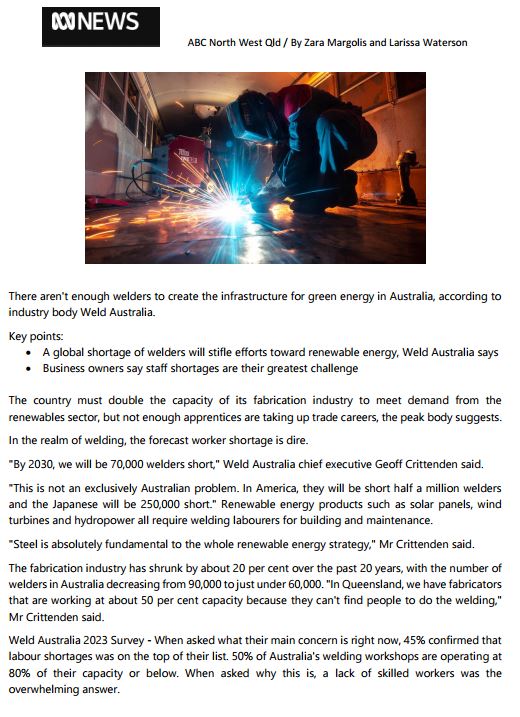Last updated on December 13th, 2023 at 10:04 am
 Weld Australia has released the results of its 2023 Member Survey, which reveals the Federal Government must step in and provide real support to industry to make the renewable energy revolution a reality.
Weld Australia has released the results of its 2023 Member Survey, which reveals the Federal Government must step in and provide real support to industry to make the renewable energy revolution a reality.
The results demonstrate that Australia’s welding and fabrication industry is facing a whole raft of challenges that will make the delivery of the Federal Government’s plans for a renewable energy revolution almost impossible—from severe labour shortages that are inhibiting the growth of the welding industry, through to rising material and labour costs.
When asked to select their top two factors, 60 per cent of survey respondents indicated that labour shortages are most likely to inhibit the growth of their business in 2023.
When asked what their main concern is right now, 45 per cent confirmed that labour shortages was on the top of their list. 50 per cent of Australia’s welding workshops are operating at 80 per cent of their capacity or below. When asked why this is, a lack of skilled workers was the overwhelming answer.
“With a considerable volume of work being onshored and a greater sentiment in the market to ‘buy local’, Australian fabrication companies are so strapped for skilled welders that they are operating well below capacity. They are being forced to turn down jobs because they simply don’t have the manpower to complete the work,” said Crittenden.
“How then, will Australian fabricators cope with the influx of work required to make the Federal Government’s renewable energy revolution reality?”
It is expected that over 11,000 wind towers will need to be produced, each requiring 500 tonnes of plate steel for onshore towers, or 750 tonnes for offshore wind towers.
To connect all this new generation to consumers, AEMO estimates more than 10,000km of new transmission lines and 25,000 transmission towers (at 30 to 60 tonnes of steel per tower) will need to be constructed.
“All this the renewable energy infrastructure will require a veritable army of skilled workers, including welders,” said Crittenden. “Australia will have a shortfall of at least 70,000 welders by 2030.”
And yet, 45 per cent of survey respondents (compared to 47 per cent in 2022) already have a pipeline of work that extends for six months or longer—this protracted pipeline is necessary in the face of ongoing skills shortage
(c) Manufacturer’s Monthly
Go back to Management Consulting
